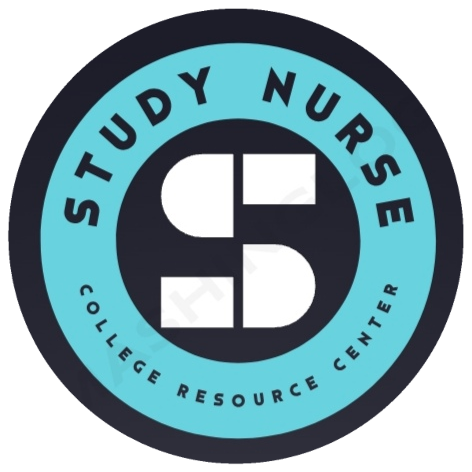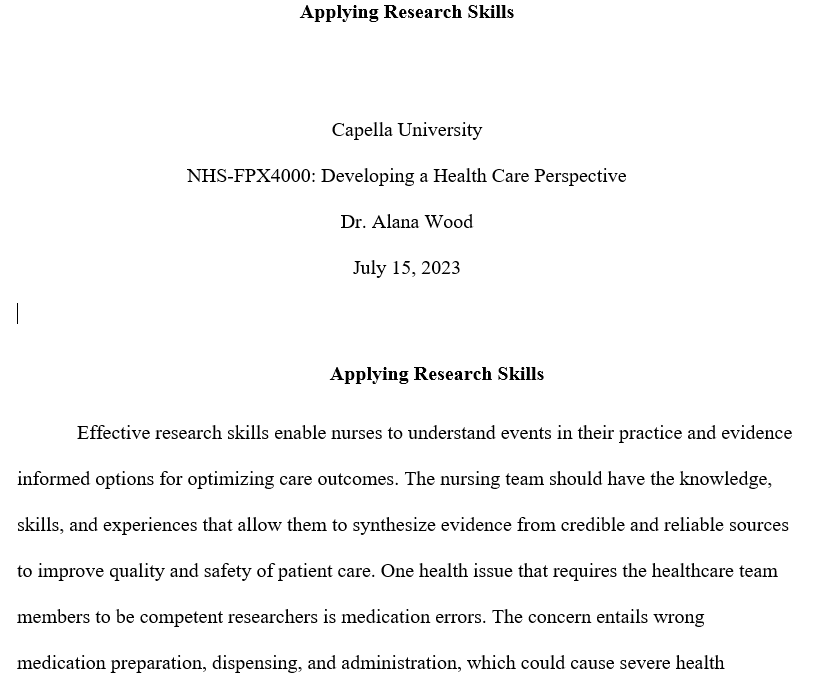Capella University
NHS-FPX4000: Developing a Health Care Perspective
Dr. Alana Wood
July 15, 2023
Applying Research Skills
Effective research skills enable nurses to understand events in their practice and evidence informed options for optimizing care outcomes. The nursing team should have the knowledge, skills, and experiences that allow them to synthesize evidence from credible and reliable sources to improve quality and safety of patient care. One health issue that requires the healthcare team members to be competent researchers is medication errors. The concern entails wrong medication preparation, dispensing, and administration, which could cause severe health complications and premature deaths. Patients are also vulnerable to prolonged hospitalization, increased frequency of readmissions, and additional costs that increase health burden. As such, it is crucial to improve research skills for adequate understanding and response to issues in a complex clinical environment. This assessment focuses on a scenario where a new nurse administered an excessive dosage of a low blood pressure medication meant for an elderly patient. The resulting fatality provides key lessons on the need for careful considerations of the medication process to protect patients from adverse outcomes.
Articles on Medication Errors
Peer-reviewed journal articles provide opportunities to acquire current and authoritative findings on the causes, consequences, and prevention measures associated with medication errors. The sources are outcomes of thorough and independent reviews by experts with adequate knowledge of issues in the nursing field. Similarly, independent reviewers check the validity and objectivity of research methodologies to ascertain their impact on nursing research. For these reasons, it is necessary to utilize credible sources such as the PubMed Central and Capella University databases. The resources enhance access to articles with accurate and complete findings on medication errors. The keywords applied for this assessment include, medication administration errors, medication errors, medication safety, and dosage errors. The search produced four articles published within the last five years to guide decisions on events in the care environment and their implications on the quality and safety of patient care.
Annotated Bibliography
Koyama, A., Maddox, C. S., Li, L., Bucknail, T., & Westbrook, J. (2020). Effectiveness of double checking to reduce medication administration errors: A systematic review. BMJ Quality & Safety, 29(7), 595-603. https://pubmed.ncbi.nlm.nih.gov/31391315/
Koyama et al. highlight the adverse consequences of medication errors and the need for evidence-based and sustainable solutions. According to the authors, double checking is a crucial practice that makes nurses responsive to events in a complex clinical setting. The process is appropriate for high-risk drugs, where patients have complex conditions and characteristics that increase the risk of errors. The systematic review allowed the authors to synthesize findings from scholarly and peer-reviewed journal articles that address effectiveness of double checking. The evidence captures the need for nurses to enhance fidelity of double checking as a means of reducing errors. The article is useful to nurse researchers aiming to contribute to recommendations about appropriate use of double checks to improve safety across care continuum. The findings also support the need for nurses to use information technology to streamline medication administration process and reduce the time taken to complete double checking processes.
Manias, E., Kusljic, S., & Wu, A. (2020). Interventions to reduce medication errors in adult medical and surgical settings: A systematic review. Therapeutic Advances in Drug Safe, 11, 1-28. https://journals.sagepub.com/doi/full/10.1177/2042098620968309
The article reminds healthcare providers about the need for increased vigilance across the various points of medication management process. The focus on acute medical and surgical units reveals the implications of medication errors on patients, the workforce, and organization. The findings also reveal the need for evidence-based and sustainable programs to prevent harm during medication administration. For instance, the authors advocate for interdisciplinary collaboration as one of the pathways that allows care professionals to identify and intercept errors. The article is useful to nurse researchers aiming to familiarize themselves with single and combined interventions that boost quality and safety of care. The systematic review also allows nurse researchers to extensively consider alternatives available in medical and surgical settings to optimize care outcomes. Thus, there are options available to focus on clinical significance of interventions such as interdisciplinary approaches that facilitate timely awareness and interception of risks within the clinical setting.
Schwappach, D. L., Taxis, K., & Pfeiffer, Y. (2018). Oncology nurses‘ beliefs and attitudes towards the double-check of chemotherapy medications: A cross-sectional survey study. BMC Health Services Research, 18(123), 1-8. https://bmchealthservres.biomedcentral.com/track/pdf/10.1186/s12913-018-2937-9.pdf
The article describes the value of double-checking in promoting safe medication administration. The focus on oncology enables the authors to present findings on the need for positive nurse attitudes and beliefs towards checking medication procedures. Experience and nurses’ frontline roles determine the quality of double-checking procedures. However, inadequate evidence on the effectiveness of doble checking undermines commitment to adopting the routine in nursing practice. The authors outline the need for training to make nurses and nurse leaders familiar with the process and how to best achieve the intended outcomes. The article is useful to nurse researchers seeking to study the limitations of double checking and evidence-based strategies for safeguarding patient care. Equally, the findings outline the need for innovative practices in the nursing field. Such options include using technologies such as bar code to eliminate distractions and adequately process a patient’s medication needs. New and better procedures reinforce commitment to maintaining a safe and highly responsive clinical environment.
Westbrook, J., Li, L., Raban, M., Woods, A., Koyama, A., Baysari, M. T., Day, R., Prgomet, M., Mumford, V., Dalla-Pozza, L., Gazarian, M., Gates, P., Barclay, P., Gardo A., Wiggins, M., & White, L. (2021). Associations between double-checking and medication administration errors: A direct observational study of pediatric inpatients. BMJ Quality & Safety, 30(4), 320-330. https://www.ncbi.nlm.nih.gov/pmc/articles/PMC7982937/
Westbrook et al. acknowledge the adverse impacts of medication errors in inpatient facilities. The authors suggest that errors usually occur due to poorly regulated practices such as the lack of independent and mandated double checking. The findings indicate that nurses are compliant with mandatory procedures. However, the nursing team fails to follow policies on independent checking, which limits them from optimizing safety outcomes throughout the care process. The article is useful to nurse researchers because it reminds researchers about the need to address gaps associated with independent double checking. The findings also reinforce calls for sound clinical judgment to reduce the risk of a nurse administering excessive high-risk drugs. Further, the article reminds the audience about the role of technological developments in making nurses responsive to medication errors. Effective use of smart IV pumps, automatic dispensing cabinets, and bar coding enhances commitment to improving the quality and safety of care across continuum.
Lessons Learned
The ability to apply research skills makes nurses more responsive to issues such as medication errors. A key lesson from developing the annotated bibliography is that nurse researchers require knowledge and skills in identifying credible and reliable sources. In this case, nurses make evidence-based decisions on risks and the best practices for intercepting them throughout the medication management process. Utilizing databases such as the PubMed Central and Capella University library provides opportunities to acquire peer-reviewed journal articles with accurate and complete findings on medication errors prevention strategies.
References
Koyama, A., Maddox, C. S., Li, L., Bucknail, T., & Westbrook, J. (2020). Effectiveness of double checking to reduce medication administration errors: A systematic review. BMJ Quality & Safety, 29(7), 595-603. https://pubmed.ncbi.nlm.nih.gov/31391315/
Manias, E., Kusljic, S., & Wu, A. (2020). Interventions to reduce medication errors in adult medical and surgical settings: A systematic review. Therapeutic Advances in Drug Safe, 11, 1-28. https://journals.sagepub.com/doi/full/10.1177/2042098620968309
Schwappach, D. L., Taxis, K., & Pfeiffer, Y. (2018). Oncology nurses‘ beliefs and attitudes towards the double-check of chemotherapy medications: A cross-sectional survey study. BMC Health Services Research, 18(123), 1-8. https://bmchealthservres.biomedcentral.com/track/pdf/10.1186/s12913-018-2937-9.pdf
Westbrook, J., Li, L., Raban, M., Woods, A., Koyama, A., Baysari, M. T., Day, R., Prgomet, M., Mumford, V., Dalla-Pozza, L., Gazarian, M., Gates, P., Barclay, P., Gardo A., Wiggins, M., & White, L. (2021). Associations between double-checking and medication administration errors: A direct observational study of pediatric inpatients. BMJ Quality & Safety, 30(4), 320-330. https://www.ncbi.nlm.nih.gov/pmc/articles/PMC7982937/

